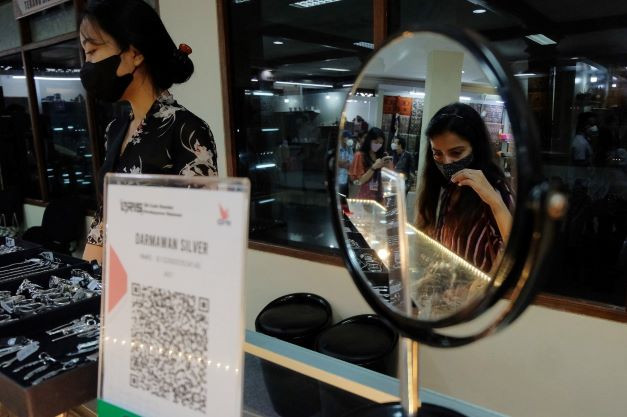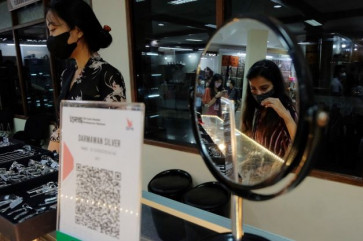Popular Reads
Top Results
Can't find what you're looking for?
View all search resultsPopular Reads
Top Results
Can't find what you're looking for?
View all search resultsA rural micro-enterprise road to embrace the digital economy
Despite the willingness to go digital, many enterprises lack the capacities and skills to effectively use digital platforms to transact online.
Change text size
Gift Premium Articles
to Anyone
 Shopping time: A buyer seen in the mirror examine products of micro, small and medium enterprises exhibited in Werdhi Budaya Art Centre in Denpasar, Bali on May 13. The event was organized by the Finance Ministry and Bank Indonesia to promote Quick Response Code Indonesian cashless payments.
(Antara/Nyoman Hendra Wibowo)
Shopping time: A buyer seen in the mirror examine products of micro, small and medium enterprises exhibited in Werdhi Budaya Art Centre in Denpasar, Bali on May 13. The event was organized by the Finance Ministry and Bank Indonesia to promote Quick Response Code Indonesian cashless payments.
(Antara/Nyoman Hendra Wibowo)
I
ndonesia is on the path to establishing itself as a world leader in e-commerce. As the COVID-19 pandemic rages on, the country’s e-commerce market continues to boom as customers’ buying behaviors change and accelerate the shift to digital channels.
A survey done by DBS bank highlights that the number of e-commerce customers in Indonesia increased to 66 percent after the COVID-19 pandemic hit the country as a direct impact of the Large-scale Social Restrictions (PSBB).
Despite such high demand, for many micro and small businesses, particularly in rural areas and peri-urban areas, going digital has been a daunting task. For most micro and small businesses, going digital is not a choice but an imperative to sustain business in the post-COVID-19 world, more so for rural enterprises that may not have direct access to markets.
However, as per the data of the Cooperatives and Small and Medium Enterprises Ministry, only 19 percent (12 million) of Indonesian micro-enterprises are part of the digital ecosystem. The latest Statistics Indonesia (BPS) data on e-commerce businesses in Indonesia show that only 8 percent of the businesses have ever received any form of formal training on using digital tools for business.
While the government and stakeholders are committed to supporting more micro, small and medium enterprises (MSMEs) in the digital ecosystems, challenges and obstacles abound. Reports indicate that access to 4G networks evades more than 12,000 villages in Indonesia. While 90 percent of 4G signals are available in urban areas, the number drops to just 76 percent in rural areas.
Even in Java -- the most developed and populous island in the archipelago -- the internet penetration is only 56.4 percen,t and the percentage is much lower in less populous islands such as Sulawesi and Papua, at below 10 percent.
As network connectivity continues to be a major concern in remote areas, some frugal innovations have enabled network access even in remote areas. A study conducted by MicroSave Consulting (MSC) found that enterprises in remote areas are selling wi-fi vouchers worth Rp 2,000-5,000 (US$0.13-$0.34) for a few hours of access. While these may not be perfect solutions and there are disruptions in the quality of access, nevertheless, they do provide a workaround until the public infrastructure reaches these locations.


















